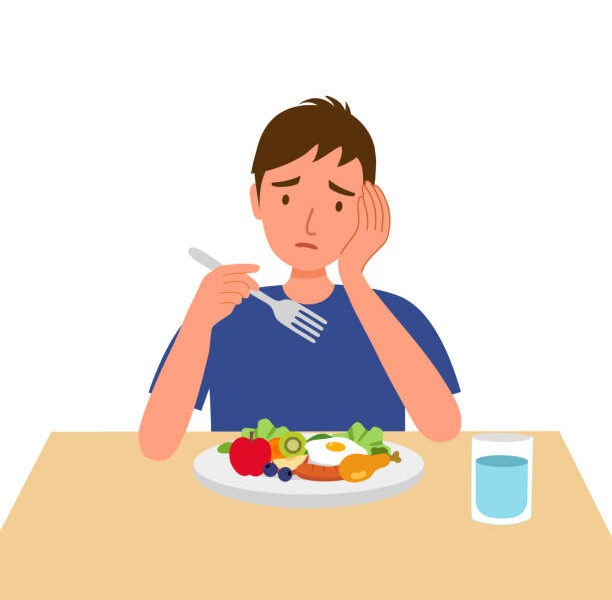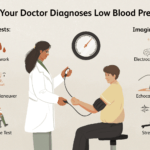Loss of appetite is when you have a reduced or absent desire to eat. It can affect your nutrition, weight and well-being. Loss of appetite can have various causes and effects on your health and well-being. In this blog post, we will discuss the causes, symptoms and treatment of loss of appetite, as well as some tips on how to prevent and cope with it.
What causes loss of appetite?
Loss of appetite can be caused by different factors, such as:
• Medical conditions: Some medical conditions can affect your appetite regulation and cause loss of appetite as a symptom or a side effect of treatment. These include:
• Infections: These are caused by bacteria, viruses, fungi or parasites that invade your body and cause inflammation and fever. Some examples are colds, flu, strep throat, urinary tract infections and tuberculosis.
• Digestive disorders: These are problems that affect your digestive system and cause nausea, vomiting, diarrhea, constipation or abdominal pain. Some examples are gastroesophageal reflux disease (GERD), irritable bowel syndrome (IBS), inflammatory bowel disease (IBD), peptic ulcers and gallstones.
• Cancer: This is when abnormal cells grow and divide uncontrollably and form tumors that can invade other tissues and organs. Cancer can cause loss of appetite due to the tumor itself, the treatments such as chemotherapy or radiation, or the side effects such as pain, fatigue or depression.
• Chronic diseases: These are long-term conditions that affect your overall health and quality of life. They can cause loss of appetite due to the disease itself, the treatments such as medications or surgery, or the complications such as anemia, kidney failure or heart failure. Some examples are diabetes, hypothyroidism, chronic obstructive pulmonary disease (COPD), congestive heart failure (CHF) and rheumatoid arthritis.
• Medications: Some medications can affect your appetite regulation and cause loss of appetite as a side effect or interact with other drugs or foods. These include antibiotics, antihistamines, antidepressants, antipsychotics, opioids, chemotherapy drugs, steroids and birth control pills.
• Psychological factors: Your emotions and mental state can also influence your appetite and eating behavior. You may lose your appetite as a result of:
• Stress: This is when you feel overwhelmed or unable to cope with the demands or challenges of your life. Stress can affect your hormones, digestion and immune system and cause loss of appetite.
• Depression is characterized by feelings of sadness. hopeless, worthless or guilty for a prolonged period of time. Depression can affect your brain chemicals, sleep and energy levels and cause loss of appetite.
• Anxiety: This is when you feel nervous, worried, fearful or panicked about something that may or may not happen. Anxiety can affect your heart rate, breathing and blood pressure and cause loss of appetite.
• Eating disorders: These are mental illnesses that involve an unhealthy relationship with food and body image. They can cause loss of appetite due to extreme dieting, binging, purging or exercising. Some examples are anorexia nervosa, bulimia nervosa and binge eating disorder.
• Environmental factors: Your surroundings can also affect your appetite and eating habits. These include:
• Social factors: These are the people and situations that influence your food choices and behaviors. You may lose your appetite due to:
• Lack of social support: This is when you feel lonely, isolated or rejected by others. You may lose interest in food or eating with others.
• Peer pressure: This is when you feel pressured to conform to the expectations or norms of others. You may lose your appetite due to trying to fit in, impress or please others.
• Cultural factors: These are the beliefs, values and traditions that shape your food preferences and practices. You may lose your appetite as a result of following certain dietary rules, restrictions or customs.
• Physical factors: These are the conditions and elements that affect your food availability and accessibility. You may lose your appetite as a result of:
• Food quality: This is the freshness, taste and safety of the food you eat. You may lose your appetite due to spoiled, bland or contaminated food.
• Food Quantity: This is the amount and variety of the food you eat. You may lose your appetite due to insufficient, excessive or monotonous food.
• Food timing: This is the frequency and regularity of the food you eat. You may lose your appetite due to skipping meals, fasting or eating at irregular times.
What are the symptoms of loss of appetite?
The main symptom of loss of appetite is having a reduced or absent desire to eat. You may also experience the following symptoms:
• Weight loss or difficulty maintaining weight
• Fatigue or weakness
• Poor concentration or memory
• Mood changes or irritability
• Low immunity or increased susceptibility to infections
• Nutritional deficiencies or anemia
How is loss of appetite diagnosed?
Loss of appetite is usually diagnosed based on your medical history, physical examination and tests. Your healthcare provider may ask you about your symptoms, when they started, how they affect you, what triggers them and what relieves them. They may also ask you about your diet, medications, allergies, medical conditions and family history. They may also perform some tests to rule out any underlying causes of loss of appetite. These tests may include:
• Blood tests: In order to look for indications of infection, inflammation, anemia, diabetes, thyroid problems or hormonal imbalances.
• Urine tests: In order to detect indicators of dehydration, diabetes or kidney problems.
• Stool tests: To check for signs of intestinal infections or parasites.
• Chest X-rays: To check for signs of lung infections or pneumonia.
• CT scans or MRI scans: To check for signs of brain infections or tumors.
How is loss of appetite treated?
The treatment of loss of appetite depends on the cause and severity of your condition and your personal goals. The main goals of treatment are to stimulate your appetite, improve your nutrition, treat the underlying cause and prevent complications. Some of the common treatments for loss of appetite are:
• Dietary changes: Changing your diet can help you stimulate your appetite by increasing your calorie intake and improving your taste buds. Some dietary changes that can help you with loss of appetite are:
• Eating small but frequent meals throughout the day.
• Choosing foods that are high in calories, protein and nutrients.
• Adding sauces, spices, herbs or condiments to enhance the flavor and aroma of foods.
• Fluids should be consumed between meals rather than with them.
• Avoiding foods that are too hot, cold, spicy or greasy.
• Eating with others or in a pleasant environment.
• Medications: Some medications can help you stimulate your appetite by affecting your brain chemicals, hormones or digestion. However, these medications are not suitable for everyone and may have side effects such as drowsiness, dry mouth, headache or constipation. You should only use these medications under the supervision of your healthcare provider and in combination with other treatments. Some examples of medications for loss of appetite are:
• Appetite stimulants: These are drugs that increase your hunger by affecting your brain chemicals such as serotonin, dopamine or histamine. Some examples are cyproheptadine, megestrol acetate and dronabinol.
• Hormone therapy: This is a treatment that involves taking synthetic hormones such as testosterone or human growth hormone (HGH) to build muscle and body weight.
• Digestive enzymes: These are supplements that help you digest food better by breaking down fats, proteins and carbohydrates in your stomach and intestines. Some examples are pancreatin, lipase and lactase.
• Nutritional supplements: These are products that provide extra calories, protein and nutrients to meet your nutritional needs. They can be taken orally or through a tube inserted into your stomach or intestine (enteral nutrition) or through a vein (parenteral nutrition). Some examples are oral nutritional supplements (ONS), protein shakes and multivitamin tablets.
• Alternative therapies: These are treatments that use natural or complementary methods to stimulate your appetite and improve your well-being. They can be used along with conventional treatments but should not replace them without consulting your healthcare provider. Some examples are acupuncture, aromatherapy, herbal remedies, hypnosis and meditation. How can loss of appetite be prevented? Some tips to prevent loss of appetite include:
• Eating a balanced diet that meets your energy and nutrient needs.
• Avoiding skipping meals or fasting as this can reduce your hunger signals.
• Drinking plenty of water and avoiding dehydration.
• Limiting alcohol intake as this can affect your appetite regulation.
• Quitting smoking as this can damage your taste buds and reduce oxygen supply to your tissues.
• Using relaxation techniques such as meditation to manage stress yoga or breathing exercises.
• Getting adequate sleep and maintaining a consistent sleep routine.
• Treating any medical conditions that may cause loss of appetite promptly.



